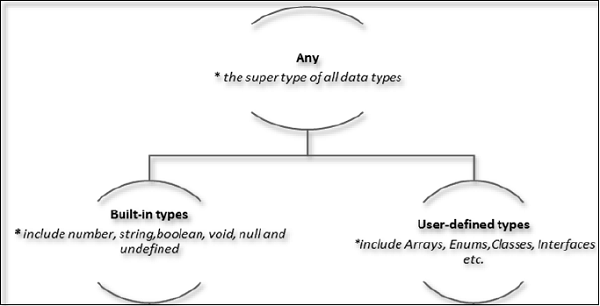The any Type in TypeScript

1. Problem Statement
You are tasked with building a dynamic survey system for a large research organization.
-
The survey questions and answers can change at any time.
-
Some questions expect a number, others expect text, some allow multiple answers, and some are open-ended.
-
The system must store and process answers of any shape, but you need to be careful not to lose track of what kind of data each answer holds.
-
Later, you want to add type safety, but for now, the system must be flexible enough to accept any kind of answer.
The challenge:
How do you design your survey system in TypeScript so it can handle unknown and changing data types, while still allowing you to gradually add type safety as the system matures?
2. Learning Objectives
-
Understand the purpose and use-cases for the
anytype in TypeScript. -
Declare and use variables that can hold any kind of value.
-
Recognize the risks and trade-offs of using
any. -
Plan for transitioning from
anyto safer types as requirements become clearer.
3. Concept Introduction with Analogy
Analogy: The Universal Inbox
Imagine your office has a universal inbox where anyone can drop off any kind of item: letters, packages, keys, or even a pizza.
-
The inbox is flexible and accepts everything, but you have to be careful when you take something out, because you never know what you’ll get.
-
If you want to sort items later, you’ll need to check what each item is before using it.
The any type in TypeScript is like this universal inbox: it’s flexible, but you lose the safety of knowing exactly what’s inside.
4. Technical Deep Dive
-
The
anytype disables type checking for a variable. -
You can assign any value to a variable of type
any. -
Operations on
any-typed variables are not checked by the compiler. -
Use
anywhen you don’t know the type in advance, but plan to replace it with a specific type as soon as possible.
Syntax:
let answer: any;
answer = 42;
answer = "blue";
answer = [1, 2, 3];
5. Step-by-Step Data Modeling & Code Walkthrough
-
Declare a survey answer variable with
any:let surveyAnswer: any; -
Assign different types of values:
surveyAnswer = "Yes";
surveyAnswer = 5;
surveyAnswer = ["Option A", "Option B"]; -
Store answers in an array:
let allAnswers: any[] = [];
allAnswers.push("No");
allAnswers.push(10);
allAnswers.push({ comment: "N/A" }); -
Process answers (with caution):
for (let ans of allAnswers) {
console.log("Received answer:", ans);
}
6. Interactive Challenge
Your Turn!
-
Create a function
recordAnswerthat takes a question ID and an answer of any type, and stores it in an object. -
Add at least three answers: a string, a number, and an array.
-
Print all recorded answers.
7. Common Pitfalls & Best Practices
-
Avoid using
anyunless truly necessary. -
Document why you’re using
anyand plan to replace it. -
Type-check values before using them (e.g., with
typeof). -
Use
unknownif you want to force type checking before use.
8. Quick Recap & Key Takeaways
-
The
anytype is flexible but removes type safety. -
Use
anyfor dynamic or unknown data, but prefer specific types when possible. -
Always validate or check the type of
anyvalues before using them.
9. Optional: Programmer’s Workflow Checklist
-
Use
anyonly when you don’t know the type. -
Replace
anywith a specific type as soon as you know the structure. -
Check the value’s type before using it.
-
Document all uses of
anyfor future refactoring.